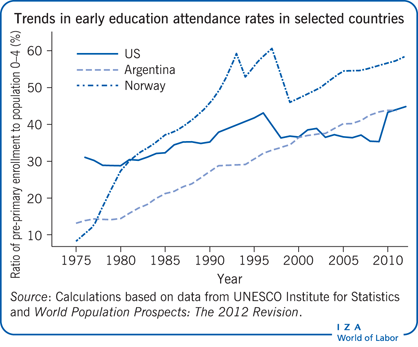Elevator pitch
There is widespread interest in universal early education, both to promote child development and to support maternal employment. Positive long-term findings from small-scale early education interventions for low-income children in the US have greatly influenced the public discussion. However, such findings may be of limited value for policymakers considering larger-scale, more widely accessible programs. Instead, the best insight into the potential impacts of universal early education comes from analysis of these programs themselves, operating at scale. This growing research base suggests that universal early education can benefit both children and families, but quality matters.

Key findings
Pros
High-quality universal early education raises test scores.
High-quality universal early education improves other markers of school readiness that may be critical for generating long-term impacts.
High-quality universal early education may increase adult educational attainment and employment and reduce welfare dependency.
The benefits of high-quality universal early education are larger for disadvantaged children.
Availability of early education can increase maternal employment, providing revenue to offset program costs.
Cons
The test score advantage from universal early education declines as children progress through school.
For children from more advantaged families, the costs of universal early education may exceed the benefits.
Universal early education that is oriented more toward childcare than preschool and is lower quality may make even disadvantaged children worse off.
Maternal labor supply impacts are larger for programs that are less beneficial for children.
Universal early education provides income support to relatively high-income families where mothers are already working.